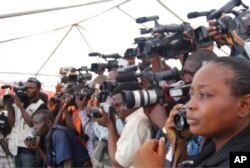A Ugandan journalist says that, as a rule, practicing journalists should never accept money in order to write stories. But, Tabu Butagira, senior reporter with the Ugandan Daily Monitor, said there are reasons why some African journalists do so.
The Daily Monitor reported in its Monday edition that several Ugandan journalists allegedly accepted as much as four million shillings, an equivalent of two thousand U.S. dollars, when they covered the ruling National Resistance Movement (NRM) Party of Uganda convention which concluded Sunday.
Butagira, who wrote the story, described Sunday as a sad day for Ugandan journalists.
“There were a number of journalists," he said. "About four or five p.m., I did see three people walking toward us on the central platform which was constructed for journalists. And, when they approached us, they raised the issue that they had received a number of phone calls allegedly from some journalists inquiring why they had not gotten their share of money which had been given by the secretariat [of the ruling NRM].”
Butagira said the money came from Hassan Galiwango, administrator of the ruling NRM, who, Butagira said, told him that it was a normal practice for journalists to be given “something” for doing their job.
“I and my colleagues had not been aware that actually some money had been given to journalists. And then, Dr. Galiwango said there were two journalists who went to him with a list of other 47 purported reporters and asked for money, and he gave them four million Ugandan shillings, an equivalent of $2,000 to share,” Butagira said.
He said some of the journalists have confirmed receiving a share of the money.
“After we published the story, one of the journalists from a local television station did come to our offices and conceded that he had received money in a white envelope, that the four million shillings were in two bundles, and they went outside the stadium and, as a group of journalists of about 40, did distribute the money, and each beneficiary pocketed 35,000 Ugandan shillings,” Butagira said.
Butagira said, although the practice of journalists accepting money is absolutely unethical, owners of media institutions in Uganda and other parts of Africa often contribute to this practice.
“Obviously, taking money to do a story is beyond question in the media fraternity, and the past problem this kind of challenge poses is how do you inform somebody who is informed that what you are doing is wrong? In Uganda, like in most African countries, there is a real challenge of employers under facilitating and underpaying journalists,” Butagira said.
He said some owners of media have taken advantage of the passion that journalists have for their profession which they see more or less as a missionary work to exploit journalists and failed to invest in them
Butagira said the impoverished nature of Ugandan journalists has also contributed to the taking of money to write certain stories.
“For instance, freelance radio reporters get paid $1.00 for an article which is news, which is an equivalent of 2,000 Uganda shillings. The situation in Uganda had deteriorated so much that, even for official invitation letters by a starting organization, including non-governmental organizations for coverage of their activities, there is always the footnote that there will be transport to the site. And, therefore, the journalism has been highly degraded,” Butagira said.
He said the challenge for Uganda journalists is that there is no uniform regulatory body to enforce professional standards. As such, he said, individual journalistic organizations employ different sanctions for errant behavior by journalists.




